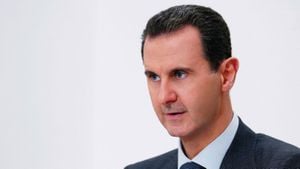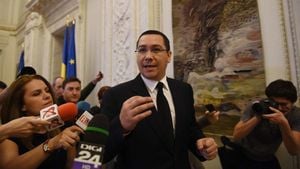Arvind Kejriwal, the Chief Minister of Delhi and leader of the Aam Aadmi Party (AAP), is entangled in significant legal battles stemming from the alleged corruption linked to the now-defunct liquor excise policy. The Enforcement Directorate (ED) has accused him of being part of a scheme involving ₹100 crores worth of kickbacks, which were purportedly used to fund election campaigns, particularly during the AAP's bids to win seats in Goa.
On December 11, 2024, Kejriwal's legal counsel, Senior Advocate Vikram Chaudhari, made headlines during proceedings at the Delhi High Court. Chaudhari argued vigorously, stating, "If the ED cannot attend to argue their case, then they should withdraw it against Arvind Kejriwal." This plea was made as the ED sought to challenge the bail previously granted to Kejriwal, leading to tense exchanges between the court's bench and the officials representing the ED.
Interestingly, the ED’s Special Counsel, Zoheb Hossain, had appeared via video link to request the case’s adjournment, citing the absence of Additional Solicitor General S.V. Raju, who was reportedly away attending family events. Chaudhari vehemently opposed this, describing the ED's approach as hindering legal proceedings without substantial reasons. The case has now been rescheduled for January 17, 2025, where the arguments concerning the bail are set to continue.
This clash isn’t isolated; back on November 21, the Delhi High Court responded to Kejriwal's plea challenging the lower court's cognizance of the ED’s chargesheet associated with the liquor policy issue. The court's engagement highlights the intricacies involved, as Solicitor General Tushar Mehta represented the ED, asserting they had received necessary sanctions to prosecute Kejriwal. Nevertheless, Kejriwal’s lawyer contested this, alleging the ED’s prosecution strategy raised more questions than answers. Chaudhari argued, “This is the same complaint as before; no new investigations have taken place.”
The roots of this scandal lie within the reforms to Delhi’s liquor licensing policy, as introduced and later annulled under Kejriwal's government. Following allegations of favoritism and corruption related to these reforms, both the Central Bureau of Investigation (CBI) and the ED launched investigations. Reports suggest the modifications to the excise policy favored specific business parties unjustly, allegedly securing kickbacks.
Flashback to August 2022, when the CBI first lodged its case. Around the same time, the ED commenced its parallel proceedings under the Prevention of Money Laundering Act (PMLA). Notably, this prompted multiple summonses directed at Kejriwal throughout the latter part of 2023 and early 2024, which he contested by providing written responses but unnerved authorities by not appearing for personal hearings, citing valid reasons.
Even as tensions mount, Kejriwal remains steadfast, insisting he is cooperating with the investigations and fought back against allegations of deliberate avoidance. He argued the trial court's actions were not backed by the provisions of the PMLA, which, according to his assertions, supersedes standard criminal laws concerning excise matters.
By August 2024, the Rouse Avenue Court had granted permission for the CBI to take prosecutorial steps against Kejriwal, which only intensified the spotlight on his administration. Every legal maneuver—whether challenging the ED’s summons or countering the claims of corruption—indicates the high stakes involved for Kejriwal personally and politically.
Adding to this drama, the Delhi High Court has been urged on several occasions to intervene and grant stays on proceedings linked to the CE’s accusations. During the hearings, Kejriwal’s attorneys have aggressively questioned the legitimacy of the ED’s charges, positioning them as mere rehashes of older complaints lacking fresh evidence.
Overall, the political ramifications of these legal battles are enormous for Kejriwal and his government, particularly as they are intertwined with electoral politics. The AAP’s campaigns, especially during the Goa elections, have come under the scrutiny of these allegations, posing challenges as they navigate this tumultuous phase.
Despite these legal challenges, Kejriwal has shown resilience. His responses indicate he intends to continue contesting the allegations vigorously, seeking not only legal victories but also maintaining political stability within his party. Whether these battles affect his position and the AAP’s future is yet to be seen as the hearings progress.



